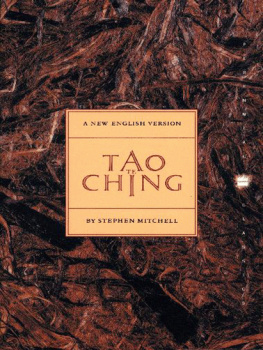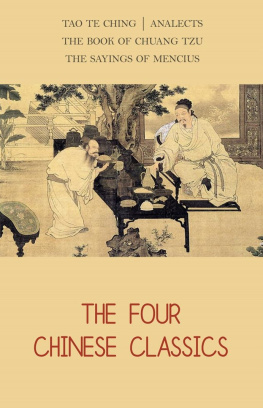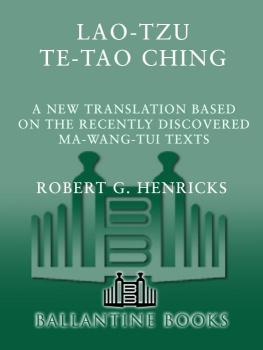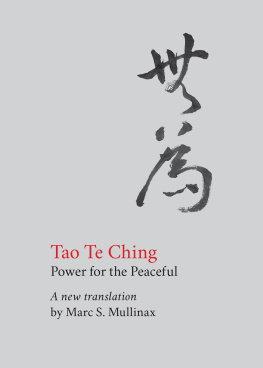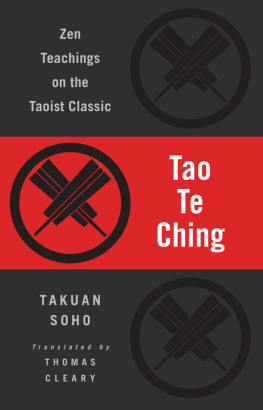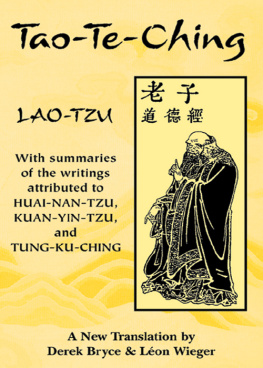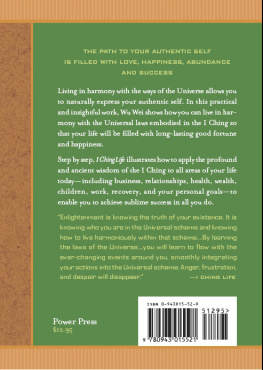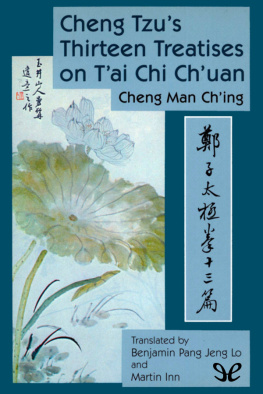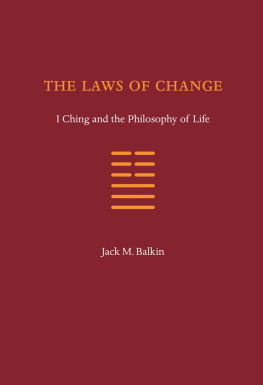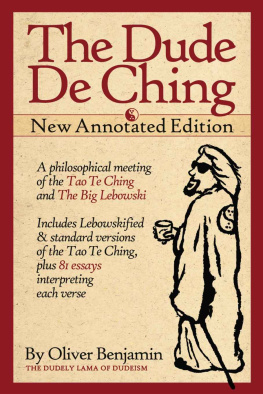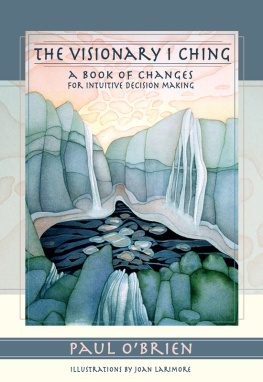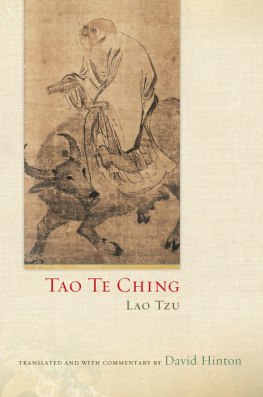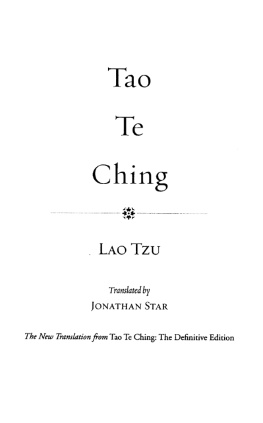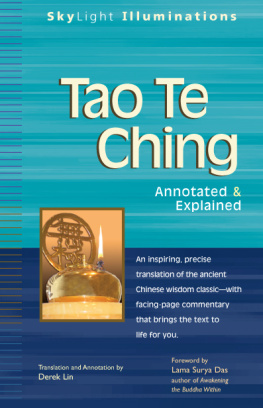TO VICKI Who can find a good woman ? She is precious beyond all things . Her husbands heart trusts her completely . She is his best reward . PROV. 31:10-11
Tao Te Ching (pronounced, more or less, Dow Deh Jing ) can be translated as The Book of the Immanence of the Way or The Book of the Way and of How It Manifests Itself in the World or, simply, The Book of the Way . Since it is already well known by its Chinese title, I have let that stand.
About Lao-tzu, its author, there is practically nothing to be said. He may have been an older contemporary of Confucius (551-479 B.C.E.) and may have held the position of archive-keeper in one of the petty kingdoms of the time. But all the information that has come down to us is highly suspect. Even the meaning of his name is uncertain (the most likely interpretations: the Old Master or, more picturesquely, the Old Boy). Like an Iroquois woodsman, he left no traces. All he left us is his book: the classic manual on the art of living, written in style of gemlike lucidity, radiant with humor and grace and largeheartedness and deep wisdom: one of the wonders of the world.
People usually think of Lao-tzu as a hermit, a dropout from society, dwelling serenely in some mountain hut, unvisited except perhaps by the occasional traveler arriving from a 60s joke to ask, What is the meaning of life? But its clear from his teachings that he deeply cared about society, if society means the welfare of ones fellow human beings; his book is, among other things, a treatise on the art of government, whether of a country or of a child. The misperception may arise from his insistence on wei wu wei , literally doing not-doing, which has been seen as passivity. Nothing could be further from the truth. A good athlete can enter a state of body-awareness in which the right stroke or the right movement happens by itself, effortlessly, without any interference of the conscious will. This is a paradigm for non-action: the purest and most effective form of action. The game plays the game; the poem writes the poem; we cant tell the dancer from the dance.
Less and less do you need to force things, until finally you arrive at non-action. When nothing is done, nothing is left undone. Nothing is done because the doer has wholeheartedly vanished into the deed; the fuel has been completely transformed into flame. This nothing is, in fact, everything. It happens when we trust the intelligence of the universe in the same way that an athlete or a dancer trusts the superior intelligence of the body. Hence Lao-tzus emphasis on softness.
Softness means the opposite of rigidity, and is synonymous with suppleness, adaptability, endurance. Anyone who has seen a tai chi or aikido master doing not-doing will know how powerful this softness is. Lao-tzus central figure is a man or woman whose life is in perfect harmony with the way things are. This is not an idea; it is a reality; I have seen it. The Master has mastered Nature; not in the sense of conquering it, but of becoming it. In surrendering to the Tao, in giving up all concepts, judgments, and desires, her mind has grown naturally compassionate.
She finds deep in her own experience the central truths of the art of living, which are paradoxical only on the surface: that the more truly solitary we are, the more compassionate we can be; the more we let go of what we love, the more present our love becomes; the clearer our insight into what is beyond good and evil, the more we can embody the good. Until finally she is able to say, in all humility, I am the Tao, the Truth, the Life. The teaching of the Tao Te Ching is moral in the deepest sense. Unencumbered by any concept of sin, the Master doesnt see evil as a force to resist, but simply as an opaqueness, a state of self-absorption which is in disharmony with the universal process, so that, as with a dirty window, the light cant shine through. This freedom from moral categories allows him his great compassion for the wicked and the selfish. Thus the Master is available to all people and doesnt reject anyone.
He is ready to use all situations and doesnt waste anything. This is called embodying the light.
What is a good man but a bad mans teacher? What is a bad man but a good mans job? If you dont understand this, you will get lost, however intelligent you are. It is the great secret. The reader will notice that in the many passages where Lao-tzu describes the Master, I have used the pronoun she at least as often as he. The Chinese language doesnt make this kind of distinction; in English we have to choose.
But since we are all, potentially, the Master (since the Master is, essentially, us), I felt it would be untrue to present a male archetype, as other versions have, ironically, done. Ironically, because of all the great world religions the teaching of Lao-tzu is by far the most female. Of course, you should feel free, throughout the book, to substitute he for she or vice versa. As to method: I worked from Paul Caruss literal version, which provides English equivalents (often very quaint ones) alongside each of the Chinese ideograms. I also consulted dozens of translations into English, German, and French. But the most essential preparation for my work was a fourteen-year-long course of Zen training, which brought me face to face with Lao-tzu and his true disciples and heirs, the early Chinese Zen Masters.
With great poetry, the freest translation is sometimes the most faithful. We must try its effect as an English poem, Dr. Johnson said; that is the way to judge of the merit of a translation. I have often been fairly literalor as literal as one can be with such a subtle, kaleidoscopic book as the Tao Te Ching. But I have also paraphrased, expanded, contracted, interpreted, worked with the text, played with it, until it became embodied in a language that felt genuine to me.
The tao that can be told is not the eternal Tao.
The tao that can be told is not the eternal Tao.
The name that can be named is not the eternal Name. The unnamable is the eternally real. Naming is the origin of all particular things. Free from desire, you realize the mystery. Caught in desire, you see only the manifestations. Yet mystery and manifestations arise from the same source.
This source is called darkness. Darkness within darkness. The gateway to all understanding.
When people see some things as beautiful, other things become ugly. When people see some things as good, other things become bad. Being and non-being create each other.
Difficult and easy support each other. Long and short define each other. High and low depend on each other. Before and after follow each other. Therefore the Master acts without doing anything and teaches without saying anything. Things arise and she lets them come; things disappear and she lets them go.
She has but doesnt possess, acts but doesnt expect. When her work is done, she forgets it. That is why it lasts forever.
If you overesteem great men, people become powerless. If you overvalue possessions, people begin to steal. The Master leads by emptying peoples minds and filling their cores, by weakening their ambition and toughening their resolve.
He helps people lose everything they know, everything they desire, and creates confusion in those who think that they know. Practice not-doing, and everything will fall into place.

